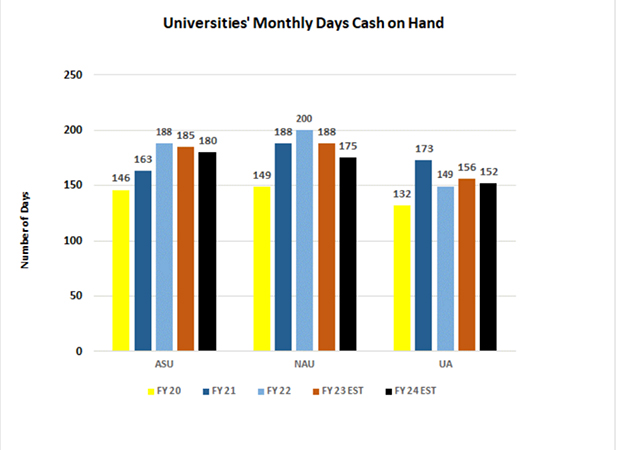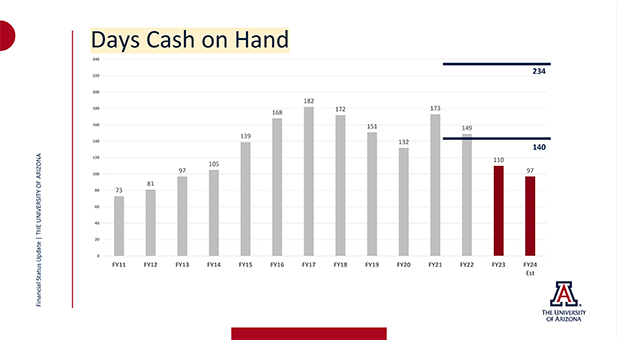 The west side of Old Main on the University of Arizona campus.
The west side of Old Main on the University of Arizona campus.
The University of Arizona unveiled a plan in front of a special meeting of the Board of Regents Wednesday night to deal with the university's financial crisis.
The plan will eliminate guaranteed tuition for students entering in Fall 2025 and rebalance undergraduate non-resident merit aid for new students. Tuition changes will not affect students currently admitted or enrolled.
“I cannot state this strongly enough…We make promises to our students and we will keep those promises,” UA President Robert Robbins said.
The changes come after the university announced in November that it is entering its worst fiscal year since 2013.
“The U of A’s financial problem was first presented as an unseen and dramatic reduction in days cash on hand,” Arizona Board of Regents Chair Fred DuVal said during Wednesday evening’s meeting. “While that's a concerning problem in and of itself, the decline of the university's cash reserves was a symptom of two other more serious problems.”
DuVal pointed to an ongoing budget deficit at UA as well as issues in both the board’s and university’s financial and reporting structures. Robbins agreed, going on to say that the number of days cash on hand issue is just a symptom of the ongoing issues.
ABOR requires universities to maintain a minimum of 140 days cash on hand. UA is at the lowest financial standing among Arizona’s three public universities. Arizona State University is projected to sit at 172 days and Northern Arizona University at 175 days.
According to ABOR documents from a June meeting this year, UA forecasted 156 days of cash on hand for FY 23 and predicted 152 days for FY 24.
 VIEW LARGER A screenshot of a financial chart from a June 1, 2023 Arizona Board of Regents document that details monthly days cash on hand.
VIEW LARGER A screenshot of a financial chart from a June 1, 2023 Arizona Board of Regents document that details monthly days cash on hand. But, during a presentation in Nov. 2nd meeting, the university showed it actually reached 110 days cash on hand for FY 23–falling 30 days short of the minimum and 46 days short of the initial forecasted number. At that same meeting, it was predicted that UA’s finances would continue falling to a predicted 97 days cash on hand by the end of FY 24.
 VIEW LARGER A screenshot from a Nov. 2, 2023 Arizona Board of Regents document that details the University of Arizona's decline of days cash on hand.
VIEW LARGER A screenshot from a Nov. 2, 2023 Arizona Board of Regents document that details the University of Arizona's decline of days cash on hand. "We were forecasting 156 days cash on hand,” Rulney said during the Nov. meeting. “I was not hiding the ball or trying to obfuscate a problem that we have at The University of Arizona.”
Rulney pointed to a faulty review model that was used for more than 10 years. That model estimated 30% over actuals.
“If we had used that new method when I gave you the figure, what I would have told you is that we were projecting to be 105 days cash on hand, which is even less than what you see,” Rulney said. “The difference is that we all would have been talking about this trend a few months earlier than we are today."
The Activity Informed Budgeting model will be eliminated and a centralized planning budget model will be put in place. UA is looking at hiring a firm to design a system that has budget and expenditure controls. Robbins did not say which firm would be hired or how much it would cost.
Rulney resigns
Robbins announced that Chief Financial Officer and Senior Vice President of Business Affairs Lisa Rulney submitted her resignation Wednesday morning ahead of the special board meeting. ABOR executive director John Arnold will now step into Rulney’s vacant position for the interim.
“He has a proven track record of leadership for both the Arizona Board of Regents and for the state of Arizona,” Robbins said. “Perhaps more importantly, I've had the pleasure of serving with John in higher education since I was named the president of the University of Arizona and I admire deeply his integrity, leadership, and effectiveness.”
Rulney’s departure marks the beginning of the university’s attempt to centralize administrative functions. Faculty, staff, and students have called for “chops from the top” since the announcement of the financial crisis.
“This work will take some time but it will begin immediately. In fact, it already has begun with a change in financial leadership at the university,” Robbins said.
Immediate and long-term changes
The university also plans to begin immediately:
- Implementing freezes on hiring and compensation
- Freezing international travel for senior administrators
- Restricting purchases
- Deferring nonessential capital projects
- Concluding strategic initiatives funding
Over the next 18 months, the university will also delay its fiscal year 2025 salary increase program, conduct individual reviews of all budget units for financial accountability, and reduce fiscal year 2025 base budgets on units spending in deficit, overhead, and administrative functions.
So far, Robbins has kept his promise to faculty and staff by not instituting furloughs or cuts to retirement.
Athletics
In a faculty senate meeting earlier this month, Robbins said athletics received nearly $86 million in loans from the university and that layoffs and an increase in ticket prices were to happen.
“They are firing people. They are laying off people. One hundred percent, they are laying off people,” Robbins said at the Dec. Faculty Senate meeting. “But if you have season tickets in basketball or football, it’s going to cost you about 25% more and I don’t think that’s enough because if we look at our peers, we’re probably 30 years behind in increasing prices.”
In the Wednesday night meeting, Robbins stood by his previous statement telling the board that there will be “a review of ticket pricing, opportunities to maximize media rights, and philanthropy and consolidating administrative functions within the university.” He did not mention layoffs within athletics during the ABOR meeting.
“Athletics is the most difficult part of the university's budget,” Robbins said. “I also believe that athletics is a core part of the University of Arizona and a key element to our long-term success.”
Increased oversight
Chair DuVal told the board that to ensure that UA successfully moves forward, they needed to also address budget and management procedures within their own ranks.
“Today, we intend to take the first steps to turn the ship around to the University of Arizona, and to assure our campuses and the public that this will not happen again, in Tucson, or at any of our state's universities,” DuVal said.
The board unanimously approved instituting four additional steps to improve financial oversight of all three of Arizona’s public universities, including new financial principles, enhanced monitoring of financial health, increased review of budgets, and providing UA with support through budget structure changes.
Most notably, the universities will now have to report monthly operating cash balances, give a mid-year financial update to the board, and take part in a required peer review process where each university will document financial planning and analysis processes to a team of representatives from the board office and the other two universities in hopes to evaluate the success of their plans.
According to a report from the board, they plan to codify the following financial management principles:
- Each university will employ a centralized financial planning and budgeting process. Highly decentralized budget systems such as Responsibility Centered Management and Activity Informed Budgeting will be eliminated.
- Each university will use a centralized management and control structure for information technology.
- Each university will implement budgetary controls to prevent college, unit, or program expenditures over established budgets.
- Each university will put budget controls on non-resident institutionally funded financial aid.
- Universities must have specific board approval to expend cash reserves below established thresholds.
- Universities will provide additional transparency in budget communication.
Regent Larry Penley told the board they have a “responsibility to put structures in place to guard against stresses in the long term.”
“We cannot rely unfortunately on past practices, nor on talented people,” Penley said. “We have a governance responsibility and that means that we have to implement tools, structures and policies to support our three presidents in our three public universities in the state of Arizona.”
ABOR Executive Director John Arnold told the board that some changes may take several months while others may be more immediate. However, the board’s approval for more oversight did not mean immediate policy changes.
“With your approval, we will take that and develop policy that we will then bring back to the board and refine all of this, so we can put it into the Board's policy documents and then implement it at the university level,” Arnold said.
Regents support Robbins’ plan
“The remedies that you're proposing seem designed to really right the ship,” Chair DuVal said. “But without doing harm to the core mission of the university. They're meaningful, scaled, but appropriately aggressive.”
DuVal told Robbins that the board appreciated his consultation with different university partners like the Faculty Senate. However, last week some senators, including Faculty Senate Chair Dr. Leila Hudson, did not share the same beliefs as DuVal concerning shared governance.
“It has become apparent that the president does not intend to engage shared governance in the formulation or review of the report,” Hudson said during a Dec. 4 meeting.
Either way, DuVal told Robbins that “regardless of how we got here, together we are going to fix it.”
Robbins admitted to the board that he “regrets that investments in the strategic plan have gotten so associated with the university's larger financial issues.”
“I firmly believe in the principles we've put in place,” Robbins said. “These initiatives have greatly advanced the lives of students and their success, as well as our research mission. As we right-size spending, we're going to have to look at what has worked, what is really moving the university forward, and what has not worked. Things that are not working will have to be abandoned.”
The Arizona Board of Regents holds the license for AZPM.

By submitting your comments, you hereby give AZPM the right to post your comments and potentially use them in any other form of media operated by this institution.